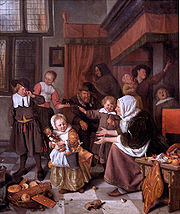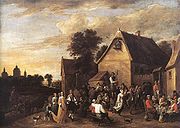
Dutch festivities
Encyclopedia


Queen's Day
Queen's Day may refer to:*Koninginnedag, a national holiday in the Netherlands, the Netherlands Antilles and Aruba*Queene's Day, a celebration of the accession of Queen Elizabeth I...
) are omitted. Major festivities include:
- Feast of Saint NicholasSinterklaasSinterklaas is a traditional Winter holiday figure still celebrated today in the Low Countries, including the Netherlands and Belgium, as well as French Flanders and Artois...
. The feast celebrates the name day of Saint NicholasSaint NicholasSaint Nicholas , also called Nikolaos of Myra, was a historic 4th-century saint and Greek Bishop of Myra . Because of the many miracles attributed to his intercession, he is also known as Nikolaos the Wonderworker...
, patron saint of, among other things, children, who are the principal focus of the feast. They receive presentGiftA gift or a present is the transfer of something without the expectation of receiving something in return. Although gift-giving might involve an expectation of reciprocity, a gift is meant to be free. In many human societies, the act of mutually exchanging money, goods, etc. may contribute to...
s, candyCandyCandy, specifically sugar candy, is a confection made from a concentrated solution of sugar in water, to which flavorings and colorants are added...
and poems. The origins of Saint NicholasSaint NicholasSaint Nicholas , also called Nikolaos of Myra, was a historic 4th-century saint and Greek Bishop of Myra . Because of the many miracles attributed to his intercession, he is also known as Nikolaos the Wonderworker...
appear to be Christian, but in fact originate from ancient Germanic mythologyGermanic paganismGermanic paganism refers to the theology and religious practices of the Germanic peoples of north-western Europe from the Iron Age until their Christianization during the Medieval period...
, with Dutch figure of SinterklaasSinterklaasSinterklaas is a traditional Winter holiday figure still celebrated today in the Low Countries, including the Netherlands and Belgium, as well as French Flanders and Artois...
representing the god Wodan. Both have a beard, hat and spear (nowadays a staff) and the cloth bag held by the servants to capture naughty children. Both Saint Nicolas and Odin ride white horses that can fly through the air. The letters made of chocolate given by the Zwarte PietZwarte PietIn the folklore and legends of the Netherlands and Belgium, Zwarte Piet is a companion of Saint Nicholas whose yearly feast in the Netherlands is usually celebrated on the evening of 5 December In the folklore and legends of the Netherlands and Belgium, Zwarte Piet (meaning Black Pete) is a...
en to the children evokes the fact that Odin ‘invented’ the rune letters. The poems made during the celebration and the songs the children sing relate to Odin as the god of the arts of poetry. It's celebrated on December 5 or 6. - ChristmasChristmasChristmas or Christmas Day is an annual holiday generally celebrated on December 25 by billions of people around the world. It is a Christian feast that commemorates the birth of Jesus Christ, liturgically closing the Advent season and initiating the season of Christmastide, which lasts twelve days...
. Among the Dutch, Christmas (which lasts two days) is a time of togetherness. Gifts are generally not exchanged. Usually it is celebrated with ones direct, and not extendedExtended familyThe term extended family has several distinct meanings. In modern Western cultures dominated by nuclear family constructs, it has come to be used generically to refer to grandparents, uncles, aunts, and cousins, whether they live together within the same household or not. However, it may also refer...
, family. It's celebrated on December 25 and 26. - New Years' Eve. The Dutch generally celebrate New Year's Eve, which is called Old Years' Night in Dutch, with friends and family. On this day, traditional New Years pastries like Oliebollen are eaten. At mid-night the Dutch wish all the best to all in their presence and fire works are set off. Following these activities it is customary to express a good intention for the next year. The following morning is marked by visits to family, usually parents. It's celebrated on December 31
- Kermesse. Originally denoting the mass said on the anniversary of the foundation of a church (or the parish) and in honour of the patron. Today Kermesse denotes the celebrations of such an anniversary. Many towns and larger villages hold their own Kermesse once every year. It can best be described as a mix of feasting, dancing, sports and fun fair attractions.
- BirthdayBirthdayA birthday is a day or anniversary where a person celebrates his or her date of birth. Birthdays are celebrated in numerous cultures, often with a gift, party or rite of passage. Although the major religions celebrate the birth of their founders , Christmas – which is celebrated widely by...
. Birthdays, called Year days in Dutch, are greeted with enthusiasm in Dutch culture. Family and friends will probably visit, call or send a cardGreeting cardA greeting card is an illustrated, folded card featuring an expression of friendship or other sentiment. Although greeting cards are usually given on special occasions such as birthdays, Christmas or other holidays, they are also sent to convey thanks or express other feeling. Greeting cards,...
. It is considered to be anti-social for a person to ignore his or her own birthday. Among the Dutch, instead of people showering the birthday person with special treats, it is the birthday person's place to treat those around him or her. This is exemplified by the custom to bring pastries for colleagues to work; and at school children bring treats for all their classClass (education)A class in education has a variety of related meanings.It can be the group of students which attends a specific course or lesson at a university, school or other educational institution, see Form ....
mates. Dutch people generally keep a special Birthday calendar, often to be found in the bathroom of their houses.

